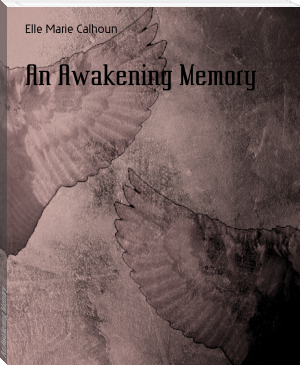Apocalypse - Ellen G. White (good book club books txt) 📗

- Author: Ellen G. White
Book online «Apocalypse - Ellen G. White (good book club books txt) 📗». Author Ellen G. White
Said the angel to John: "Come hither, I will show thee the bride, the Lamb's wife." "He carried me away in the spirit," says the prophet, "and showed me that great city, the holy Jerusalem, descending out of heaven from God." Revelation 21:9, 10. Clearly, then, the bride represents the Holy City, and the virgins that go out to meet the bridegroom are a symbol of the church. In the Revelation the people of God are said to be the guests at the marriage supper. Revelation 19:9. If guests, they cannot be represented also as the bride . Christ, as stated by the prophet Daniel, will receive from the Ancient of Days in heaven, "dominion, and glory, and a kingdom;" He will receive the New Jerusalem, the capital of His kingdom, "prepared as a bride adorned for her husband." Daniel 7:14; Revelation 21:2. Having received the kingdom, He will come in His glory, as King of kings and Lord of lords, for the redemption of His people, who are to "sit down with Abraham, and Isaac, and Jacob," at His table in His kingdom (Matthew 8:11; Luke 22:30), to partake of the marriage supper of the Lamb.
The proclamation, "Behold, the Bridegroom cometh," in the summer of 1844, led thousands to expect the immediate advent of the Lord. At the appointed time the Bridegroom came, not to the earth, as the people expected, but to the Ancient of Days in heaven, to the marriage, the reception of His kingdom. "They that were ready went in with Him to the marriage: and the door was shut." They were not to be present in person at the marriage; for it takes place in heaven, while they are upon the earth. The followers of Christ are to "wait for their Lord, when He will return from the wedding." Luke 12:36. But they are to understand His work, and to follow Him by faith as He goes in before God. It is in this sense that they are said to go in to the marriage.
In the parable it was those that had oil in their vessels with their lamps that went in to the marriage. Those who, with a knowledge of the truth from the Scriptures, had also the Spirit and grace of God, and who, in the night of their bitter trial, had patiently waited, searching the Bible for clearer light-these saw the truth concerning the sanctuary in heaven and the Saviour's change in ministration, and by faith they followed Him in His work in the sanctuary above. And all who through the testimony of the Scriptures accept the same truths, following Christ by faith as He enters in before God to perform the last work of mediation, and at its close to receive His kingdom--all these are represented as going in to the marriage.
In the parable of Matthew 22 the same figure of the marriage is introduced, and the investigative judgment is clearly represented as taking place before the marriage. Previous to the wedding the king comes in to see the guests, to see if all are attired in the wedding garment, the spotless robe of character washed and made white in the blood of the Lamb. Matthew 22:11; Revelation 7:14. He who is found wanting is cast out, but all who upon examination are seen to have the wedding garment on are accepted of God and accounted worthy of a share in His kingdom and a seat upon His throne. This work of examination of character, of determining who are prepared for the kingdom of God, is that of the investigative judgment, the closing of work in the sanctuary above.
When the work of investigation shall be ended, when the cases of those who in all ages have professed to be followers of Christ have been examined and decided, then, and not till then, probation will close, and the door of mercy will be shut. Thus in the one short sentence, "They that were ready went in with Him to the marriage: and the door was shut," we are carried down through the Saviour's final ministration, to the time when the great work for man's salvation shall be completed.
In the service of the earthly sanctuary, which, as we have seen, is a figure of the service in the heavenly, when the high priest on the Day of Atonement entered the most holy place, the ministration in the first apartment ceased. God commanded: "There shall be no man in the tabernacle of the congregation when he goeth in to make an atonement in the holy place, until he comes out." Leviticus 16:17. So when Christ entered the holy of holies to perform the closing work of the atonement, He ceased His ministration in the first apartment. But when the ministration in the first apartment ended, the ministration in the second apartment began. When in the typical service the high priest left the holy on the Day of Atonement, he went in before God to present the blood of the sin offering in behalf of all Israel who truly repented of their sins. So Christ had only completed one part of His work as our intercessor, to enter upon another portion of the work, and He still pleaded His blood before the Father in behalf of sinners. This subject was not understood by Adventists in 1844. After the passing of the time when the Saviour was expected, they still believed His coming to be near; they held that they had reached an important crisis and that the work of Christ as man's intercessor before God had ceased.
It appeared to them to be taught in the Bible that man's probation would close a short time before the actual coming of the Lord in the clouds of heaven. This seemed evident from those scriptures which point to a time when men will seek, knock, and cry at the door of mercy, and it will not be opened. And it was a question with them whether the date to which they had looked for the coming of Christ might not rather mark the beginning of this period which was immediately to precede His coming. Having given the warning of the judgment near, they felt that their work for the world was done, and they lost their burden of soul for the salvation of sinners, while the bold and blasphemous scoffing of the ungodly seemed to them another evidence that the Spirit of God had been withdrawn from the rejecters of His mercy. All this confirmed them in the belief that probation had ended, or, as they then expressed it, "the door of mercy was shut."
But clearer light came with the investigation of the sanctuary question. They now saw that they were correct in believing that the end of the 2300 days in 1844 marked an important crisis. But while it was true that that door of hope and mercy by which men had for eighteen hundred years found access to God, was closed, another door was opened, and forgiveness of sins was offered to men through the intercession of Christ in the most holy. One part of His ministration had closed, only to give place to another. There was still an "open door" to the heavenly sanctuary, where Christ was ministering in the sinner's behalf. Now was seen the application of those words of Christ in the Revelation, addressed to the church at this very time: "These things saith He that is holy, He that is true, He that hath the key of David, He that openeth, and no man shutteth; and shutteth, and no man openeth; I know thy works: behold, I have set before thee an open door, and no man can shut it." Revelation 3:7, 8.
It is those who by faith follow Jesus in the great work of the atonement who receive the benefits of His mediation in their behalf, while those who reject the light which brings to view this work of ministration are not benefited thereby. The Jews who rejected the light given at Christ's first advent, and refused to believe on Him as the Saviour of the world, could not receive pardon through Him. When Jesus at His ascension entered by His own blood into the heavenly sanctuary to shed upon His disciples the blessings of His mediation, the Jews were left in total darkness to continue their useless sacrifices and offerings. The ministration of types and shadows had ceased. That door by which men had formerly found access to God was no longer open. The Jews had refused to seek Him in the only way whereby He could then be found, through the ministration in the sanctuary in heaven. Therefore they found no communion with God. To them the door was shut. They had no knowledge of Christ as the true sacrifice and the only mediator before God; hence they could not receive the benefits of His mediation.
The condition of the unbelieving Jews illustrates the condition of the careless and unbelieving among professed Christians, who are willingly ignorant of the work of our merciful High Priest. In the typical service, when the high priest entered the most holy place, all Israel were required to gather about the sanctuary and in the most solemn manner humble their souls before God, that they might receive the pardon of their sins and not be cut off from the congregation. How much more essential in this antitypical Day of Atonement that we understand the work of our High Priest and know what duties are required of us.
Men cannot with impunity reject the warning which God in mercy sends them. A message was sent from heaven to the world in Noah's day, and their salvation depended upon the manner in which they treated that message. Because they rejected the warning, the Spirit of God was withdrawn from the sinful race, and they perished in the waters of the Flood. In the time of Abraham, mercy ceased to plead with the guilty inhabitants of Sodom, and all but Lot with his wife and two daughters were consumed by the fire sent down from heaven. So in the days of Christ. The Son of God declared to the unbelieving Jews of that generation: "Your house is left unto you desolate." Matthew 23:38. Looking down to the last days, the same Infinite Power declares, concerning those who "received not the love of the truth, that they might be saved": "For this cause God shall send them strong delusion, that they should believe a lie: that they all might be damned who believed not the truth, but had pleasure in unrighteousness." 2 Thessalonians 2:10-12. As they reject the teachings of His word, God withdraws His Spirit and leaves them to the deceptions which they love.
But Christ still intercedes in man's behalf, and light will be given to those who seek it. Though this was not at first understood by Adventists, it was afterward made plain as the Scriptures which define their true position began to open before them. The passing of the time in 1844 was followed by a period of great trial to those who still held the advent faith. Their only relief, so far as ascertaining their true position was concerned, was the light which directed their minds to the sanctuary above. Some renounced their faith in their former reckoning of the prophetic periods and ascribed to human or satanic agencies the powerful influence of the Holy Spirit which had attended the advent movement. Another class firmly held that the Lord had led them in their past experience; and as they waited and watched and prayed to know the will of God they saw that their great High Priest had entered upon another work of ministration, and, following Him by faith, they were led to see also the closing work of the church. They had a clearer understanding of the first and second angels' messages, and were prepared to receive and give to the world the solemn warning of the third angel of Revelation 14





Comments (0)